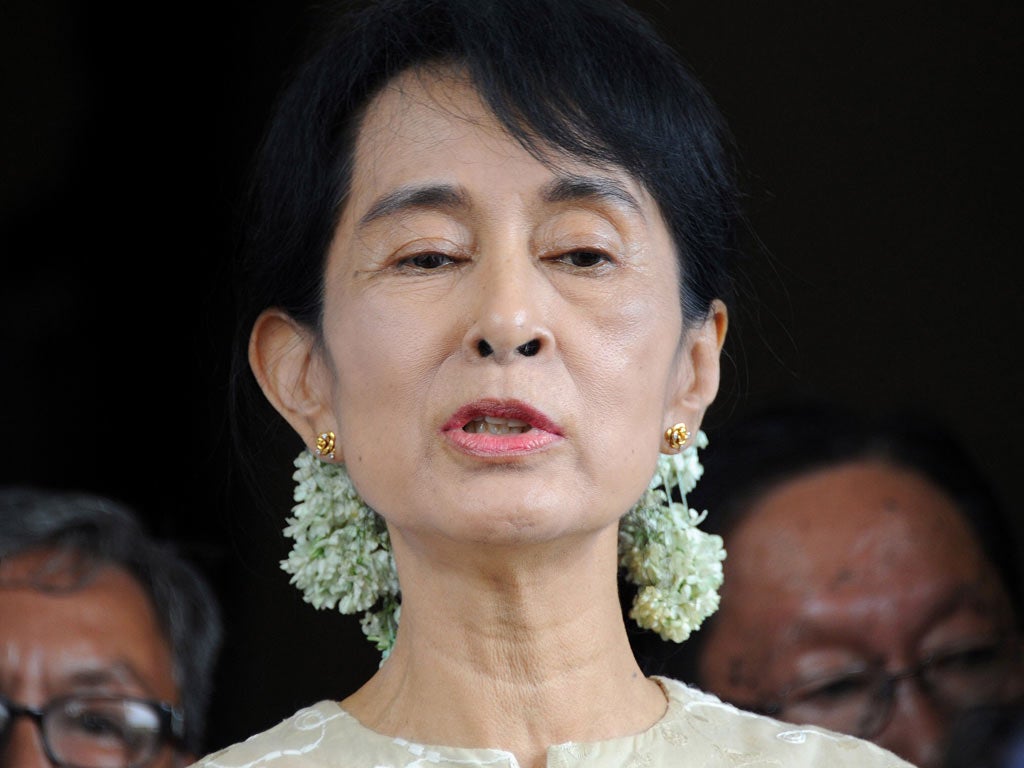Suu Kyi has sights on political return a year after winning freedom
Burma's government bids for international friends with promise of more prisoner releases

One year to the day after her release from house arrest, the Burmese democracy leader Aung San Suu Kyi may be on the brink of the biggest breakthrough of her career. As the Burmese government reportedly prepares to release another 2,000 prisoners this week, Ms Suu Kyi's spokesman said it was "likely" that she would stand in a by-election, which could be held next month.
President Thein Sein, a former general who assumed office this year, has held talks with Ms Suu Kyi, and has legalised trade unions and marginally relaxed Burma's tough censorship laws. He has also allowed Ms Suu Kyi's image and words to be available to the public for the first time since 1989.
He has frozen work on a highly unpopular Chinese-sponsored dam across the Irrawaddy River, saying it is "against the will of the people", and approved the release of some of Burma's 2,000 political prisoners.
The anniversary of Ms Suu Kyi's release may see another prisoner release, with Burmese sources predicting that some high-profile detainees such as Min Ko Naing and Ko Ko Gyi, who helped organise mass protests against the regime in 1988 and 2007, could be set free or at least moved to prisons closer to their families. But the charm offensive has left untouched many areas of Burmese life most heavily criticised by the outside world. The Burmese army still pursues long-running wars against insurgents in Karen, Shan and Kachin states, on the eastern and northern borders, ignoring Ms Suu Kyi's demands for negotiations on a peace deal. Abysmal standards of health care and education, facts of life in Burma for decades, are unchanged.
Wai Hnin, campaigns officer at Burma Campaign (UK), commented: "Small reforms... have to be balanced against almost 150,000 people in ethnic states fleeing attacks by the Burmese army, the increased use of gang-rape against women and girls [in the insurgency areas], and most political prisoners remaining in jail."
Thomas Ojea Quintana, UN Human Rights envoy to Burma, was permitted to visit the country for the first time in years, but reported, "serious human rights violations, including attacks against civilian populations, extrajudicial killings, sexual violence, arbitrary arrest and detention, internal displacement, land confiscation, the recruitment of child soldiers and forced labour and portering."
If President Thein Sein's reforms have gone largely unnoticed by the Burmese masses, they have drawn the favourable attention of the outside world. After her meeting with President Thein Sein in August, Ms Suu Kyi said she believed he wanted to achieve "real, positive change" and US Secretary of State Hillary Clinton echoed those words on Saturday. "It appears that there are real changes taking place on the ground," Mrs Clinton said, "and we support these early efforts at reform."
One of those efforts involved making changes to the law governing the registration of political parties, opening the way for Ms Suu Kyi's National League for Democracy to re-enter a system it quit last year when parties were barred from having political prisoners or detainees among their members.
This week the party will debate whether to re-register. If it does, it is predicted that Ms Suu Kyi could run in a by-election as early as December. It is rumoured that the regime has offered her a senior ministerial post, but it would seem she regards democratic endorsement by the electorate as a vital preliminary.
Subscribe to Independent Premium to bookmark this article
Want to bookmark your favourite articles and stories to read or reference later? Start your Independent Premium subscription today.

Join our commenting forum
Join thought-provoking conversations, follow other Independent readers and see their replies